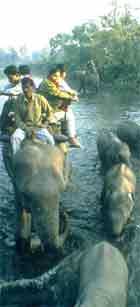The jungles of northeast India are home to about 7,500 elephants, half the country's total elephant population, but in recent years the normally gentle animals have been coming into conflict with man more frequently and more dangerously. The space between nature and men is dwindeling slowly. The traditional habitats of the elephants are taken over by man. So they stray away from the jungle and raid villages looking for food.
The elephant festival is being organised to create awareness among the people about the habits of the animal so that they can live together in peace.
The Festival is also a show case of the rich and diverse heritage of Kaziranga National Park which till date is known more for the one horn rhino even though it has more than 1,050 elephants (one of the highest concentration of elephants in any single park in the world) and more than 86 tigers, which is also one of the highest ecological densities in the world in any protected area as of today. Kaziranga, with its tall thickets of grass, is ideal habitat for elephants, the one-horn rhino, tigers, wild buffaloes and other animals. According to the 2006 census Kaziranga National Park (KNP) has recorded 1855 rhinos - 405 mothers and 405 calves. 81,758 tourists visited the Kaziranga in the year 2005-2006.
Tourists from across the world visit the elephant festival. It is a real feast for the people to see a large number of elephants in one place.
The festival aims to project the cultural and heritage of the North-East in general and Assam in particular. A large number of cultural troupes and people associated with wildlife from all over India participates in this festival.
Photo by courtesy of India Tourism, Amsterdam




